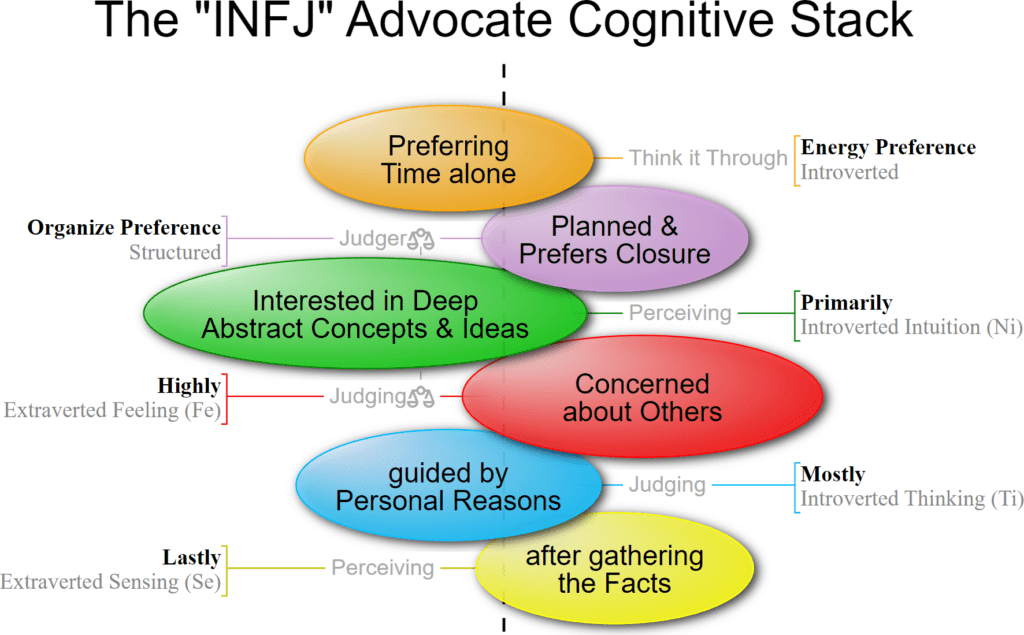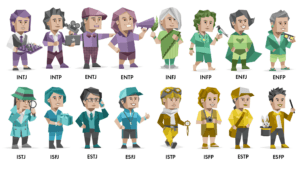The INFJ Advocate Personality Type

People with the INFJ Personality Type are creative, gentle, caring, reserved, and highly sensitive to others’ feelings.
Advocates are typically idealistic, with high moral standards and a strong focus on the future.
What sets the Advocates apart is their ability to translate their idealism into action.
With Introverted Intuition as their dominant function, Advocates are primarily interested in abstract concepts and ideas.
They enjoy thinking about deep topics and contemplating the meaning of life.
With extraverted feelings as their principal extraverted function, advocates are Judges and use objective values when making decisions.

Advocates are guided by their introverted thinking using personal subjective reasoning and like to gather facts with the lowest function of extraverted sensing.
Advocates are introverted, preferring time alone to think things through. They are structured, like to plan, and prefer closure.
Advocates are “Abstract Judges” with Introverted Intuition and Extraverted Feelings. When feeling threatened, they are more likely to be so invested in their general negative view of themselves that they overlook details that contradict that view. They may also behave with the Placater Satir Communication Style.
INFJ Personality Type cross-reference
- Keisey Type – Counselor
- Temperament Type – Phlegmatic
- Animal Type – Otter
- DISC Type – Influential
- Socio-Communicative Type – Expressive
- True Colors – Blue
- Color Code – Blue
- Personality Compass – West
- Occupational Type – Artistic
- Learning Type – Theorist
- Leadership Type – Collaborator
Enneagram Types
The Enneagram is a Personality Typing System comprising nine different types.

Dominant Function – Introverted Intuition
- They tend to be highly focused on their internal insights.
- Once they have formed an intuition about something, they tend to stick to it very tightly, often to the point of being single-minded in their focus.
- Because of this, they are sometimes viewed as stubborn and unyielding.
Auxiliary Function – Extraverted Feeling
- They are highly aware of what other people are feeling, which means they are sometimes less aware of their emotions.
- For this reason, they sometimes struggle to say no to other people’s requests.
- They are so attuned to other people’s feelings that they fear causing disappointment or hurt feelings.
Tertiary Function – Introverted Thinking
- They make decisions based on ideas and theories that they form based on their insights.
- They rely primarily on their introverted intuition and extraverted feelings when making decisions, mainly around others.
- However, people with this personality type may rely more on their introverted thinking.
- In stressful situations, an INFJ might rely on emotions when making decisions, especially if it means pleasing others.
- Under less stressful conditions, however, an INFJ is more likely to rely more on their intuition.
Inferior Function – Extraverted Sensing
- While this is a less developed and largely unconscious aspect of the INFJ, it impacts personality.
- This aspect of personality helps them pay attention to the world around them and stay aware of their surroundings.
- Extraverted sensing also helps them live in the present rather than worry about the future.
- This aspect of personality also helps them appreciate physical activities such as hiking and dancing.
INFJ Traits
INFJs are creative, compassionate, gentle, and complex. They have a natural ability to relate to others and usually find themselves to be the ones their friends confide in.
While naturally introverted, people with this personality type can form solid and meaningful connections with others.
They are sensitive people, strongly dislike criticism and conflicts, and may not readily be able to tolerate them.
They have high expectations for themselves and others, which may lead to conflict.
With their strong intuition and emotional understanding, INFJs can be soft-spoken and empathetic. However, this does not mean that they are pushovers.
Their primary function is Introverted Intuition. In contrast, their auxiliary function is Extraverted Feeling, in which they are deeply concerned with their relationships with others and humanity.
They desire to contribute to the welfare of all and find it rewarding to help others realize their human potential.
They value solitude and the opportunity to concentrate on what is essential.
If they find something exciting, they will research that topic and often ruminate.
They are perfectionists and always wonder whether or not they are living up to their full potential.
INFJs do not believe in compromising because they have strong ideals.
They believe profoundly and can act decisively to get what they want.
While this personality type may be characterized by idealism, this does not mean that INFJs see the world through rose-colored glasses. They understand the world, both the good and the bad, and hope to improve it.
They place a greater emphasis on personal concerns than objective facts when making decisions.
Strengths
- Sensitive to the needs of others.
- Reserved
- Highly creative and artistic.
- They are focused on the future.
- Values close, deep relationships.
- They enjoy thinking about the meaning of life.
- Idealistic
Weaknesses
- They can be overly sensitive.
- Sometimes, they are challenging to get to know.
- Can have excessively high expectations.
- Stubborn
- Dislikes confrontation.
INFJ Relationships
Friendships
- Because they are reserved and private, INFJs can be difficult to get to know.
- They value close, deep relationships highly and can be easily hurt, although they often hide these feelings from others.
- Interacting with an INFJ involves understanding and supporting their need to retreat and recharge.
- People with this personality type sometimes feel misunderstood.
- You can be a good friend by taking the time to understand their perspective and appreciating their strengths.
Personal Relationships
- They also have a talent for language and are usually quite good at expressing themselves.
- They have a vivid inner life.
- Still, they are often hesitant to share this with others except for perhaps those closest to them.
- While they are quiet and sensitive, they can also be good leaders.
- Even when they don’t take on overt leadership roles, they often act as quiet influencers behind the scenes.
- Their strong values drive them to seek meaning in all areas of their lives, including relationships and work.
- People with this personality type are often described as deep and complex.
- Although they may not have a large circle of acquaintances, their close friendships tend to be very tight and long-lasting.
- They are interested in helping others and improving the world.
- They tend to be excellent listeners and are good at interacting with people with whom they are emotionally close and connected.
- While they care deeply about others, they tend to be very introverted and are only willing to share their “true selves” with a select few.
- After being in social situations, they need time to ” recharge.”
Partner Relationships
- They have an innate ability to understand other people’s feelings and enjoy being in close, intimate relationships.
- They tend to flourish best in romantic relationships with people with whom they share their core values.
- Providing the support and emotional intimacy an INFJ craves is essential as a partner.
- Sincerity, honesty, and authenticity are traits the INFJ appreciates in their partner.
Parenting
- Because they are skilled at understanding feelings, they tend to be very close and connected to their children.
- They have high standards and can have very high behavioral expectations.
- They are concerned with raising kind, caring, and compassionate children.
- INFJs encourage their children to pursue their interests and talents to realize their full potential.
INFJ Careers
- They do well in careers where they can express their creativity.
- Because people with INFJ personalities have deeply held convictions and values, they do exceptionally well in jobs that support these principles.
- They often do best in careers that combine their creativity and desire to make meaningful changes.
- They are usually high achievers and excel in academics and the workplace.
- They can be perfectionists sometimes and tend to put great effort into their work.
- Co-workers feel hardworking, optimistic, and easy to get along with.
- Because they are introverted, however, they may find that they need to retreat at times to recharge.
- In managerial roles, they sometimes struggle to exert authority.
- They tend to lead sensitively and are good at helping subordinates feel appreciated in the workplace.
- Jobs requiring a great deal of routine or strict rules can be difficult.


